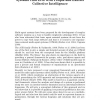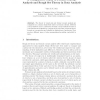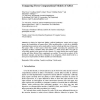343 search results - page 4 / 69 » Comparative Analysis of Frameworks for Knowledge-Intensive I... |
ARGMAS
2009
Springer
14 years 2 months ago
2009
Springer
Resolving the semantic heterogeneity problem is crucial to allow interoperability between ontology-based systems. Ontology matching based on argumentation is an innovative research...
BMCBI
2010
13 years 2 months ago
2010
Background: The Ensembl project produces updates to its comparative genomics resources with each of its several releases per year. During each release cycle approximately two week...
ESAW
2009
Springer
13 years 5 months ago
2009
Springer
009), which constitutes an abstraction of the various aspects of a MAS, generalizing the AGR approach and incorporating the institutional work of Searle (Searle 1995). This model i...
RSCTC
2004
Springer
14 years 27 days ago
2004
Springer
The theory of rough sets and formal concept analysis are compared in a common framework based on formal contexts. Different concept lattices can be constructed. Formal concept ana...
PAAMS
2010
Springer
14 years 10 days ago
2010
Springer
In aiming for behavioral fidelity, artificial intelligence cannot and no longer ignores the formalization of human affect. Affect modeling plays a vital role in faithfully simulati...



